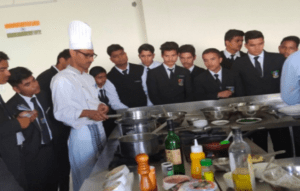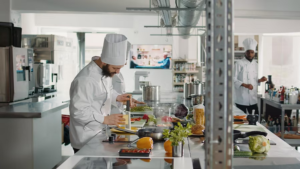Introduction to Beer, Spirits and Liqueurs- Introduction to Beer, Spirits, and Liqueurs in BHMCT (Bachelor of Hotel Management and Catering Technology) programs typically covers the fundamental concepts related to alcoholic beverages, their production, service, and responsible consumption. This course provides students with the knowledge and skills necessary to work in the hospitality industry, particularly in bars, restaurants, and hotels, where the understanding of alcoholic beverages is essential.
Here’s an overview of what this course might entail:
- Introduction to Alcoholic Beverages:
- Understanding the classification of alcoholic beverages (beer, spirits, liqueurs).
- Historical context and cultural significance of these beverages.
- Beer:
- The brewing process: malting, mashing, boiling, fermenting, and conditioning.
- Types of beer and their characteristics (e.g., lager, ale, stout).
- Beer service techniques, including draught beer handling and glassware.
- Spirits:
- Distillation process for various spirits (e.g., whiskey, vodka, rum).
- Regional variations in spirits production and their unique qualities.
- Tasting and sensory evaluation of spirits.
- Liqueurs:
- What distinguishes liqueurs from other alcoholic beverages.
- Popular liqueurs and their ingredients.
- Cocktail preparation using liqueurs.
- Responsible Beverage Service:
- The importance of responsible alcohol service in the hospitality industry.
- Legal regulations related to the sale and consumption of alcohol.
- Techniques for preventing over-service and dealing with intoxicated customers.
- Mixology and Cocktails:
- Basic principles of mixology and cocktail making.
- Classic cocktail recipes and their variations.
- Garnishing and presentation of cocktails.
- Wine Appreciation (optional):
- Introduction to wine and wine types (red, white, sparkling).
- Wine pairing with food.
- Wine service techniques.
- Food and Beverage Pairing:
- Matching alcoholic beverages with various cuisines and dishes.
- Creating harmonious flavor combinations.
- Bar Management:
- Inventory control and stock management.
- Bar equipment and layout.
- Marketing and promotion of alcoholic beverages.
- Health and Safety:
- The effects of alcohol on the human body.
- Responsible drinking and harm reduction.
- Dealing with alcohol-related incidents and emergencies.
- Trends in the Beverage Industry:
- Emerging trends in the world of alcoholic beverages.
- Sustainability and ethical considerations in the industry.
Throughout the course, students may also have practical sessions where they learn bartending skills, including pouring, mixing, and presenting beverages. They might have the opportunity to work in simulated bar environments to gain hands-on experience.
Additionally, students are often encouraged to develop their palate and appreciation for alcoholic beverages through tasting sessions. These sessions can help them better understand the nuances of different beverages and improve their ability to recommend and serve them to customers responsibly.
Please note that the specific content and emphasis of this course may vary from one educational institution to another, and it might be adapted to local laws and regulations regarding alcohol.
What is Introduction to Beer, Spirits and Liqueurs
As of my last knowledge update in September 2021, there wasn’t a standard or widely recognized course called “BHMCT Introduction to Beer, Spirits, and Liqueurs” specifically. However, BHMCT (Bachelor of Hotel Management and Catering Technology) programs typically include courses related to beverages, including alcoholic beverages like beer, spirits, and liqueurs, as part of their curriculum.
The course content I mentioned in my previous response outlines what is commonly covered in these programs. BHMCT programs aim to provide students with a well-rounded education in hotel and hospitality management, and understanding alcoholic beverages is an important aspect of this education, as many hospitality professionals may work in establishments where alcohol is served.
If “BHMCT Introduction to Beer, Spirits, and Liqueurs” is a specific course title at a particular institution, the course content and structure would be defined by that institution’s curriculum and faculty. Therefore, I recommend consulting the course catalog or contacting the institution offering this course for detailed information on its content, objectives, and any specific requirements.
Please note that course titles and content can change over time and may vary between educational institutions, so it’s essential to refer to the most recent program documentation provided by the institution you are interested in.
When is Introduction to Beer, Spirits and Liqueurs

The scheduling of courses, including “Introduction to Beer, Spirits, and Liqueurs” within a BHMCT program, can vary widely from one institution to another.
To find out when the course “Introduction to Beer, Spirits, and Liqueurs” is offered in a specific BHMCT program, you should:
- Consult the Institution’s Course Catalog: Most educational institutions have a course catalog or program handbook available on their website. This catalog will typically list the courses offered within the BHMCT program and their respective schedules.
- Contact the Admissions or Academic Department: If you’re considering enrolling in a BHMCT program and have questions about the course schedule, you can contact the admissions or academic department of the specific institution you’re interested in. They can provide you with the most up-to-date information about course offerings and schedules.
- Speak to Academic Advisors: If you are already enrolled in a BHMCT program, you can consult with your academic advisor or faculty members to get information on when the “Introduction to Beer, Spirits, and Liqueurs” course is typically offered.
Remember that course schedules can vary each semester or academic year, so it’s essential to get the most current information from the institution directly.
Application of Introduction to Beer, Spirits and Liqueurs
The knowledge and skills gained from a course like “BHMCT Introduction to Beer, Spirits, and Liqueurs” can have various practical applications within the hospitality and beverage industries. Here are some key applications:
- Bartending and Mixology: Graduates with a solid understanding of beer, spirits, and liqueurs can pursue careers as bartenders or mixologists. They can work in bars, nightclubs, restaurants, and hotels, creating and serving a wide range of alcoholic beverages, including cocktails and specialty drinks.
- Bar Management: Knowledge of alcoholic beverages is crucial for those aspiring to manage bars and beverage operations within hospitality establishments. This includes inventory management, menu development, pricing strategies, and staff training.
- Sommelier or Wine Steward: While the focus of this course is on beer, spirits, and liqueurs, it may also cover wine to some extent. Graduates can use this knowledge to become sommeliers or wine stewards, responsible for curating wine lists, assisting customers with wine selection, and ensuring proper wine service.
- Hotel and Restaurant Management: Hotel and restaurant managers benefit from a comprehensive understanding of alcoholic beverages. They can oversee beverage service, pair wines and spirits with food menus, and ensure compliance with alcohol-related laws and regulations.
- Event Planning and Catering: Professionals in event planning and catering often need to coordinate beverage services for weddings, parties, and corporate events. Knowledge of beer, spirits, and liqueurs is valuable for designing drink menus and managing beverage logistics.
- Hospitality Sales and Marketing: Graduates can work in sales and marketing roles for beverage companies, promoting and selling beer, spirits, and liqueurs to bars, restaurants, and hotels. Understanding the product is essential for effective sales and marketing strategies.
- Culinary Arts: In some culinary programs, beverage knowledge is integrated into the curriculum. Chefs can use this knowledge to create dishes that complement specific beverages, enhancing the overall dining experience.
- Responsible Beverage Service: Graduates can play a crucial role in ensuring responsible alcohol service. They can help establish policies and practices to prevent overconsumption, train staff on responsible service, and manage situations involving intoxicated guests.
- Entrepreneurship: Some graduates may choose to start their own businesses in the beverage or hospitality industry. They can open bars, restaurants, breweries, or distilleries, using their knowledge to craft unique beverage offerings and manage their operations effectively.
- Consulting and Education: Experienced professionals can offer consulting services to bars, restaurants, and hotels looking to improve their beverage programs. They can also become educators, teaching courses on beverage management, mixology, and responsible service.
In summary, the skills and knowledge acquired through a course like “BHMCT Introduction to Beer, Spirits, and Liqueurs” have a wide range of applications within the hospitality and beverage industries, from bartending and bar management to event planning, sales, entrepreneurship, and more. The versatility of this knowledge opens up various career opportunities for graduates in these fields.
Case Study on Introduction to Beer, Spirits and Liqueurs
The Craft Cocktail Lounge
Background:
Imagine a trendy boutique hotel, “The Urban Elegance,” located in the heart of a bustling city. The hotel’s management is keen on offering a unique experience for its guests and has decided to open a craft cocktail lounge as part of its amenities. They want the lounge to become known for its inventive cocktails, curated spirits selection, and exceptional service.
Challenges:
- Concept Development: The hotel management needs to develop a concept for the craft cocktail lounge that reflects the hotel’s upscale image and appeals to the urban clientele.
- Beverage Selection: They need to curate a diverse and high-quality selection of spirits, liqueurs, and craft beers that align with the lounge’s concept and customer preferences.
- Cocktail Menu: Designing an innovative cocktail menu that features signature drinks and classics with a unique twist is a priority.
- Bartender Training: The lounge must hire and train skilled bartenders who can not only make exceptional cocktails but also educate guests about the beverages they offer.
Application of “BHMCT Introduction to Beer, Spirits, and Liqueurs”:
Concept Development: The hotel management consults with their BHMCT-educated beverage specialist to craft the concept. Drawing on their knowledge of different beverage types and customer preferences, they decide to create a “Prohibition-era Speakeasy” ambiance for the lounge. This concept includes vintage décor, jazz music, and an extensive menu of classic and bespoke cocktails.
Beverage Selection: The beverage specialist uses their understanding of various spirits, liqueurs, and craft beers to curate a diverse and appealing selection. They consider regional and international options, ensuring a mix of well-known brands and artisanal products to cater to different tastes.
Cocktail Menu: With the help of a mixologist trained in “BHMCT Introduction to Beer, Spirits, and Liqueurs,” the lounge creates a cocktail menu that showcases creativity and craftsmanship. They introduce unique cocktails like “Prohibition Punch” featuring a house-made rum infusion and “Gatsby’s Garden” with locally sourced botanical liqueurs.
Bartender Training: Bartenders at “The Urban Elegance” lounge undergo rigorous training led by the BHMCT graduate. They learn not only how to craft cocktails skillfully but also the stories behind each spirit and liqueur. This knowledge enhances the guest experience as bartenders can engage in meaningful conversations about the beverages they serve.
Results: “The Urban Elegance” craft cocktail lounge becomes a major attraction for both hotel guests and city residents. It gains a reputation for its exceptional beverages, expertly crafted cocktails, and immersive Prohibition-era atmosphere. The lounge experiences increased revenue and guest satisfaction, contributing positively to the hotel’s overall success.
In this case study, the knowledge and skills acquired through “BHMCT Introduction to Beer, Spirits, and Liqueurs” played a crucial role in developing a successful craft cocktail lounge, from concept development and beverage selection to menu creation and staff training. The integration of this expertise led to a unique and profitable venture within the hospitality industry.
White paper on Introduction to Beer, Spirits and Liqueurs
Abstract: Provide a brief summary of the white paper, highlighting its purpose and key findings.
1. Introduction:
- Explain the significance of beverage education in the hospitality industry.
- Introduce the scope and objectives of the white paper.
2. Background:
- Provide an overview of the Bachelor of Hotel Management and Catering Technology (BHMCT) program.
- Highlight the role of “Introduction to Beer, Spirits, and Liqueurs” within this program.
3. The Importance of Beverage Education:
- Discuss the relevance of teaching beer, spirits, and liqueurs in a hospitality management curriculum.
- Explore the career opportunities and skills gained through this course.
4. Course Content and Curriculum:
- Outline the typical topics covered in the course, including:
- Beer production and types.
- Distillation and spirits categories.
- Liqueurs and their characteristics.
- Responsible beverage service.
- Discuss any practical components, such as bartending skills or tasting sessions.
5. Industry Impact:
- Analyze how graduates with knowledge of beer, spirits, and liqueurs contribute to the hospitality and beverage industries.
- Provide examples of successful applications and careers.
6. Trends and Innovations:
- Highlight emerging trends in the alcoholic beverage industry.
- Discuss how the course adapts to keep students informed about industry developments.
7. Case Studies:
- Include one or more real-world case studies demonstrating the practical application of the knowledge gained from the course. For instance, success stories of graduates in bartending, bar management, or beverage entrepreneurship.
8. Challenges and Future Directions:
- Address any challenges in teaching this course.
- Suggest possible improvements or future directions for the curriculum.
9. Conclusion:
- Summarize the key takeaways from the white paper.
- Reiterate the importance of beverage education in the context of hospitality management.
10. References:
- Cite relevant sources, research studies, and literature that support the points made in the white paper.
11. Appendices:
- Include additional information, such as course syllabi, sample lesson plans, or interviews with industry experts, if applicable.
Remember to conduct thorough research and gather data to support your claims and recommendations within each section of the white paper. Additionally, tailor the content to the specific context of the BHMCT program and the course you are addressing.






